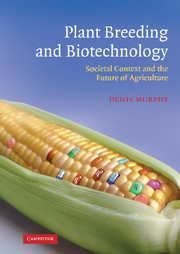Book contents
- Frontmatter
- Contents
- Preface
- Acknowledgements
- Using this book
- Nomenclature and terminology
- Abbreviations and glossary
- Introduction
- Part I The science of plant breeding
- Part II The societal context of plant breeding
- 4 Rise of the public sector and the US pioneers
- 5 Public sector breeding in the UK
- 6 Breeding goes global: the Green Revolution and beyond
- Part III Turmoil and transition: the legacy of the 1980s
- Part IV The agbiotech paradigm
- Part V Increasing global crop production: the new challenges
- Part VI Plant breeding in the twenty-first century
- Notes
- References
- Index
4 - Rise of the public sector and the US pioneers
Published online by Cambridge University Press: 07 May 2010
- Frontmatter
- Contents
- Preface
- Acknowledgements
- Using this book
- Nomenclature and terminology
- Abbreviations and glossary
- Introduction
- Part I The science of plant breeding
- Part II The societal context of plant breeding
- 4 Rise of the public sector and the US pioneers
- 5 Public sector breeding in the UK
- 6 Breeding goes global: the Green Revolution and beyond
- Part III Turmoil and transition: the legacy of the 1980s
- Part IV The agbiotech paradigm
- Part V Increasing global crop production: the new challenges
- Part VI Plant breeding in the twenty-first century
- Notes
- References
- Index
Summary
I know of no pursuit in which more real and important services can be rendered to any country than by improving its agriculture, its breed of useful animals, and other branches of a husbandman's cares.
George Washington (1732–1799) Letter to John SinclairIntroduction
In this and subsequent chapters of Parts and, we will follow the evolution of plant breeding research over the past two centuries. Many changes in the conduct of plant breeding have occurred in response to the increasing input of scientific knowledge. But it has also been deeply influenced by wider changes in the organisation of the societies and cultures in which such research activities are embedded. In the modern world, it seems positively invidious to make a distinction between those who discover new knowledge and those who apply it to create new and useful products, such as improved crops. Both are part of a single process of the acquisition and exploitation (for whatever purpose) of knowledge. They form a single continuum, the extreme points of which may appear quite distinct, but are in reality linked with each other by a series of tightly linked intermediate stages. The processes involved in the discovery and subsequent application of scientific knowledge in a subject such as plant biology have always been inextricably linked. It seems that these lessons may have been forgotten by some scientists, as their disciplines were professionalised and in some cases removed from an immediate context of societal relevance as the twentieth century progressed.
- Type
- Chapter
- Information
- Plant Breeding and BiotechnologySocietal Context and the Future of Agriculture, pp. 59 - 72Publisher: Cambridge University PressPrint publication year: 2007



